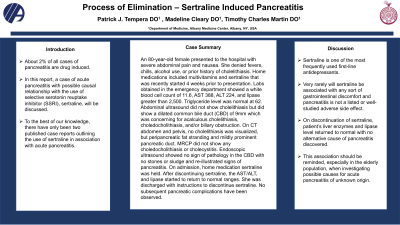Sunday Poster Session
Category: Biliary/Pancreas
P0142 - Process of Elimination - Sertraline Induced Pancreatitis
Sunday, October 22, 2023
3:30 PM - 7:00 PM PT
Location: Exhibit Hall

Has Audio

Patrick Tempera, DO
Albany Medical Center
Albany, NY
Presenting Author(s)
Patrick Tempera, DO1, Madeline Cleary, DO1, Timothy Charles. Martin, DO2
1Albany Medical Center, Albany, NY; 2Albany Medical College, Albany, NY
Introduction: Many risk factors are causally related to acute pancreatitis. About 2% of all cases of pancreatitis are drug induced. In this report, a case of acute pancreatitis with possible causal relationship with the use of selective serotonin reuptake inhibitor (SSRI), sertraline, will be discussed. To the best of our knowledge, there have only been two published case reports outlining the use of sertraline in association with acute pancreatitis.
Case Description/Methods: An 80-year-old female presented to the hospital with severe abdominal pain and nausea. She denied fevers, chills, alcohol use, or prior history of cholelithiasis. Home medications included multivitamins and sertraline that was recently started 4 weeks prior to presentation. Labs obtained in the emergency department showed a white blood cell count of 11.6, AST 388, ALT 224, and lipase greater than 2,500. Triglyceride level was normal at 62. Abdominal ultrasound did not show cholelithiasis but did show a dilated common bile duct (CBD) of 9mm which was concerning for acalculous cholelithiasis, choledocholithiasis, and/or biliary obstruction. On CT abdomen and pelvis, no cholelithiasis was visualized, but peripancreatic fat stranding and mildly prominent pancreatic duct. MRCP did not show any choledocholithiasis or cholecystitis. Endoscopic ultrasound showed no sign of pathology in the CBD with no stones or sludge and re-illustrated signs of pancreatitis. On admission, home medication sertraline was held. After discontinuing sertraline, the AST/ALT, and lipase started to return to normal ranges. She was discharged with instructions to discontinue sertraline. No subsequent pancreatic complications have been observed.
Discussion: Sertraline is one of the most frequently used first-line antidepressants. Common sertraline side effects include sexual dysfunction, drowsiness, weight gain, insomnia, dizziness, headache, and dry mouth. Very rarely will sertraline be associated with any sort of gastrointestinal discomfort and pancreatitis is not a listed or well-studied adverse side effect. In the above case, other etiologies of pancreatitis were considered, however, on discontinuation of sertraline, patient’s liver enzymes and lipase level returned to normal with no alternative cause of pancreatitis discovered. Because of the potential severity of pancreatitis, and the widespread use of sertraline, this association should be reminded, especially in the elderly population, when investigating possible causes for acute pancreatitis of unknown origin.
Disclosures:
Patrick Tempera, DO1, Madeline Cleary, DO1, Timothy Charles. Martin, DO2. P0142 - Process of Elimination - Sertraline Induced Pancreatitis, ACG 2023 Annual Scientific Meeting Abstracts. Vancouver, BC, Canada: American College of Gastroenterology.
1Albany Medical Center, Albany, NY; 2Albany Medical College, Albany, NY
Introduction: Many risk factors are causally related to acute pancreatitis. About 2% of all cases of pancreatitis are drug induced. In this report, a case of acute pancreatitis with possible causal relationship with the use of selective serotonin reuptake inhibitor (SSRI), sertraline, will be discussed. To the best of our knowledge, there have only been two published case reports outlining the use of sertraline in association with acute pancreatitis.
Case Description/Methods: An 80-year-old female presented to the hospital with severe abdominal pain and nausea. She denied fevers, chills, alcohol use, or prior history of cholelithiasis. Home medications included multivitamins and sertraline that was recently started 4 weeks prior to presentation. Labs obtained in the emergency department showed a white blood cell count of 11.6, AST 388, ALT 224, and lipase greater than 2,500. Triglyceride level was normal at 62. Abdominal ultrasound did not show cholelithiasis but did show a dilated common bile duct (CBD) of 9mm which was concerning for acalculous cholelithiasis, choledocholithiasis, and/or biliary obstruction. On CT abdomen and pelvis, no cholelithiasis was visualized, but peripancreatic fat stranding and mildly prominent pancreatic duct. MRCP did not show any choledocholithiasis or cholecystitis. Endoscopic ultrasound showed no sign of pathology in the CBD with no stones or sludge and re-illustrated signs of pancreatitis. On admission, home medication sertraline was held. After discontinuing sertraline, the AST/ALT, and lipase started to return to normal ranges. She was discharged with instructions to discontinue sertraline. No subsequent pancreatic complications have been observed.
Discussion: Sertraline is one of the most frequently used first-line antidepressants. Common sertraline side effects include sexual dysfunction, drowsiness, weight gain, insomnia, dizziness, headache, and dry mouth. Very rarely will sertraline be associated with any sort of gastrointestinal discomfort and pancreatitis is not a listed or well-studied adverse side effect. In the above case, other etiologies of pancreatitis were considered, however, on discontinuation of sertraline, patient’s liver enzymes and lipase level returned to normal with no alternative cause of pancreatitis discovered. Because of the potential severity of pancreatitis, and the widespread use of sertraline, this association should be reminded, especially in the elderly population, when investigating possible causes for acute pancreatitis of unknown origin.
Disclosures:
Patrick Tempera indicated no relevant financial relationships.
Madeline Cleary indicated no relevant financial relationships.
Timothy Martin indicated no relevant financial relationships.
Patrick Tempera, DO1, Madeline Cleary, DO1, Timothy Charles. Martin, DO2. P0142 - Process of Elimination - Sertraline Induced Pancreatitis, ACG 2023 Annual Scientific Meeting Abstracts. Vancouver, BC, Canada: American College of Gastroenterology.
